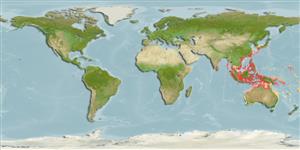Environment: milieu / climate zone / depth range / distribution range
นิเวศวิทยา
เกี่ยวกับทะเล,น้ำเค็ม เกี่ยวกับหินโสโครก; ระดับความลึก 20 - 40 m (Ref. 559). Tropical
Western Pacific: southern Japan southward. Reported from the Indian Ocean (Ref. 45255). Randall & Pyle (2000, Ref. 48242) note that Pseudanthias manadensis has not been convincingly linked to any species recognized today.
ขนาด / น้ำหนัก / Age
Maturity: Lm ? range ? - ? cm
Max length : 9.5 cm SL เพศผู้/กระเทย; (Ref. 559)
Highly variable in color. Females have an orange to red spot on the back, centrally at the base of the spinous dorsal-fin, that elongates in larger individuals and males. In some males it shows as a yellow bar and some large individuals have extended tips on the caudal fin (Ref. 48635).
Inhabits rocky reefs. A deep water species, usually in depths over 40 m and appears to occur primarily on current-prone soft-bottom slopes (Ref. 48635).
Life cycle and mating behavior
วัยเจริญพันธุ์ | การสืบพันธุ์ | การวางไข่ | เซลสืบพันธ์ของเพศเมีย(ไข่) | ความดกของไข่ | ตัวอ่อน
Masuda, H., K. Amaoka, C. Araga, T. Uyeno and T. Yoshino, 1984. The fishes of the Japanese Archipelago. Vol. 1. Tokai University Press, Tokyo, Japan. 437 p. (text). (Ref. 559)
IUCN Red List Status (Ref. 130435: Version 2024-2)
Threat to humans
Harmless
Human uses
เครื่องมือ
Special reports
Download XML
แหล่งที่มาจากอินเตอร์เน็ต
Estimates based on models
Preferred temperature (Ref.
123201): 24.2 - 28.5, mean 28 °C (based on 93 cells).
Phylogenetic diversity index (Ref.
82804): PD
50 = 0.5000 [Uniqueness, from 0.5 = low to 2.0 = high].
Bayesian length-weight: a=0.01349 (0.00618 - 0.02945), b=3.00 (2.81 - 3.19), in cm total length, based on LWR estimates for this (Sub)family-body shape (Ref.
93245).
ระดับชั้นอาหาร (Ref.
69278): 3.4 ±0.4 se; based on size and trophs of closest relatives
ความสามารถในการกลับคืนสู่ปกติ (Ref.
120179): ความสูง, เวลาต่ำสุดที่จะทำให้ประชากรเพิ่มขึ้นเป็น 2 เท่าใช้เวลาน้อยกว่า 15 เดือน (Preliminary K or Fecundity.).
Fishing Vulnerability (Ref.
59153): Low vulnerability (10 of 100).
